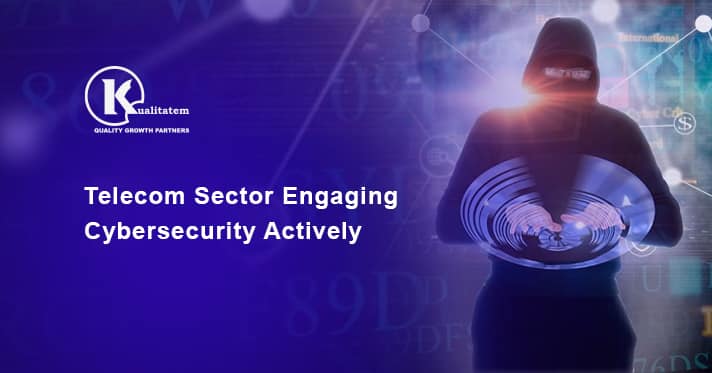Telecom Sector Engaging Cybersecurity Actively

- April 14, 2020
- HibaSulaiman
Cyber security remains the spotlight with various incidents and vulnerabilities reported affecting the telecom companies. Telecom companies need to emphasize the risks posed to their operations and update proactive defenses and cyber security response plans to highlight the increased legal, operational, technical and regulatory risks they face. This is why firms need to hire a software testing services company to ensure they have placed the right strategies to strengthen their cyberspace.
The telecommunications industry is all about keeping the world connected. Moreover, our economies and businesses are dependent on modern telecoms. From emails, phone calls to video conferencing, we rely on them each day for communications. In fact, telecoms are an intrinsic part of our lives that we almost require them like any basic necessity.
Telecom Companies are ‘New Targets’ for Cyber Criminals
Telecoms are huge businesses that support different business verticals. They build and operate complex networks, store huge amounts of sensitive data to meet all business communication needs. This is the main reason why this sector is highly attractive to cyber criminals. There are two types of cyber-attacks that telecom providers face. Direct attacks from criminals who aim to access their organization’s network operations and data. While on the other hand, they attack indirectly where they target an organization’s subscribers.
Various Types of Malicious Attacks on Telcos
Since telecom companies are a common gateway to access multiple businesses, malicious attackers use direct cyber attacks to access the core infrastructure of a telecom company. Once they have managed to gain access to the network, cyber-criminals easily access data and control and impersonate the subscribers, simultaneously. However, it still remains a difficult task for malicious cyber criminals, yet not impossible. In recent times, the cyber attacks on these companies have increased and become more sophisticated, becoming a greater threat for everyone. Organizations move towards hiring a software testing services company to secure the telecommunications industry in an effective manner.
Common Threat to Telcos
Telcos face particular cyber security issues as a result of their interconnectedness and the reliance upon the international standards in their operations. For instance, telcos rely on the Signaling System 7 protocol (SS7) i.e. a standard protocol by which global companies interoperate to facilitate roaming calls and text messages. It has been confirmed that these protocols contain vulnerabilities that allow access to texts, calls and location information, other than the subscriber. It also allows calls, texts and other media to be diverted from a subscriber’s handset to that of an attacker.
Another common targets of cyber-attacks include the internet routers, both used in the backbone of the Internet and the consumer routers. Backbone routers process the data of multiple firms at the same time, while targeting these routers the hackers manage to compromise many organizations at once. Similarly, telecom companies have also faced a number of distributed denial-of-service (DDoS) attacks against the internet providers that caused outages across Twitter, Netflix, Paypal and other services. It also disabled some subscribers’ routers permanently, which meant they had to replace them physically.
Most of these attacks pose great challenges since protocols such as SS7 are defined by international standards, so it is critical to acquire international cooperation to resolve such vulnerabilities. Unless these vulnerabilities are resolved, and no actions are taken to mitigate these risks, telcos are faced with growing liabilities arising from the increasing cyber incidents.
The Industry Fights Against Vulnerabilities
With respect to the increasing cyber issues and incidents, regulators and governments tend to increase their intervention against these protocol vulnerabilities, to the extent these or other cyber issues that begin to compromise the privacy of communications networks. Telecom companies need to ensure that proactive defence and cyber incident response plans that address the risks to such incidents. It is important to have the right people on board, otherwise the cyber-crime rate will keep increasing. Thus, it is critical to address the ever-evolving and growing sophisticated cyber crime incidents with the right cyber security measures in place.
Since communication technologies are incorporated in other industries and beyond that traditional critical infrastructure and organizations are identifying weak areas around cyber security systems in these sectors. Software testing services company follows a flexible approach that evolves with tech innovation and security practices for any organization. As a risk based approach, telecommunication companies protect their systems by assessing threats and also by developing and implementing appropriate risk-management practices.
Apart from reducing the risk of infiltration, using an effective security measure means that any attack that is detected quickly, can be resolved accordingly. With early detection, criminals have less time to cause less damage to the systems. Although, complete cyber security solutions are not that cheap, yet it is important to think of them as a long-term investment for the future. The cost of a major security breach will be higher, both in the short and long-term. Customers believe their information is not safe with a company, they tend to switch to other service providers.
Conclusion
The cyber-crimes in the telecom sector are complex and strange. Thus, mitigating risks is important and requires an equally complex line of defense mechanism. For these companies to resist cyber crime, they require educating their employees, and invest in the right technological solutions that can stand tall for cyber security. Thus, telecom companies in different jurisdictions will have to follow strict compliance with cyber security protocols to ensure their businesses and subscribers are safe from cyber-breaches and attacks.











